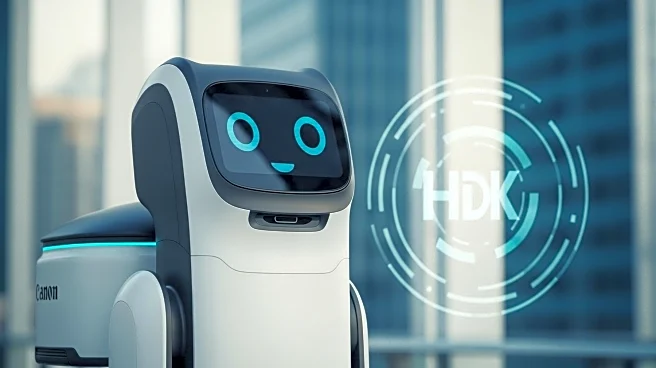What is the story about?
What's Happening?
DoorDash has unveiled Dot, its latest self-driving delivery robot, designed to navigate streets and sidewalks in Phoenix. The robot features a red exterior, can carry up to 30 pounds of cargo, and is equipped with lidar sensors and cameras for navigation. Dot's design includes anthropomorphic features, such as LED lights that resemble eyes, and the ability to greet restaurant workers. DoorDash emphasizes the robot's 'cuteness' as a key feature, aiming to make the delivery experience more engaging. Dot is part of DoorDash's broader strategy to integrate autonomous technology into its delivery services, alongside human drivers and drones.
Why It's Important?
The introduction of Dot highlights the growing trend of automation in the delivery industry, with potential implications for efficiency and cost reduction. By utilizing autonomous robots, DoorDash aims to enhance its delivery capabilities and reduce operational costs, which could lead to lower prices for consumers. The focus on Dot's 'cuteness' also reflects a strategic effort to make technology more approachable and acceptable to the public. However, the shift towards automation raises concerns about the future of human delivery jobs and the ethical implications of increased surveillance and data collection.
What's Next?
DoorDash plans to expand Dot's deployment beyond Phoenix, potentially introducing the robot to other major markets. The company will likely continue to refine Dot's technology and operations based on feedback from the initial testing phase. As Dot becomes more widespread, DoorDash may face regulatory challenges and public scrutiny regarding safety and job displacement. The company will need to work closely with local governments and communities to address these concerns. Additionally, DoorDash's competitors may accelerate their efforts to develop similar technologies, leading to increased competition in the autonomous delivery space.
Beyond the Headlines
The deployment of Dot could have broader implications beyond the immediate logistics industry. It may influence urban planning and infrastructure development, as cities adapt to accommodate autonomous vehicles. The technology behind Dot, including its sensor suite and AI capabilities, could also spur innovation in other sectors, such as transportation and robotics. Ethically, the shift towards automation raises questions about data privacy and the potential for increased surveillance. As companies like DoorDash continue to innovate, they must navigate these complex issues to ensure responsible and sustainable growth.















